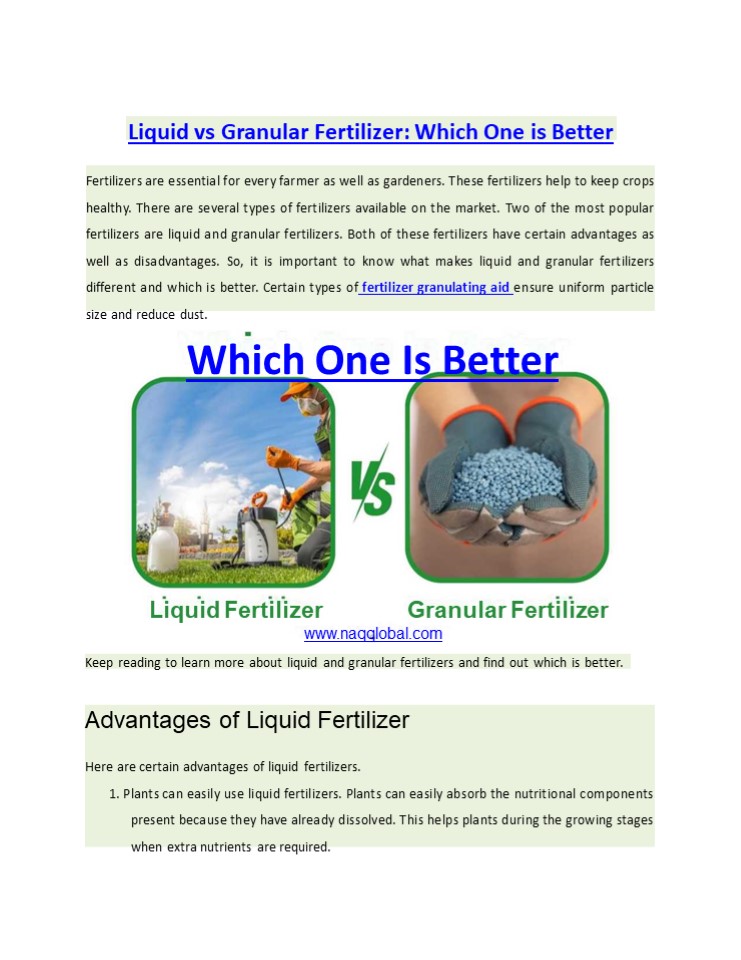Liquid vs Granular Fertilizer: Which One is Better - PowerPoint PPT Presentation
Title:
Liquid vs Granular Fertilizer: Which One is Better
Description:
Fertilizers are essential for every farmer as well as gardeners. These fertilizers help to keep crops healthy. There are several types of fertilizers available on the market. Two of the most popular fertilizers are liquid and granular fertilizers. Both of these fertilizers have certain advantages as well as disadvantages. So, it is important to know what makes liquid and granular fertilizers different and which is better. Certain types of fertilizer granulating aid ensure uniform particle size and reduce dust. – PowerPoint PPT presentation
Number of Views:3
Title: Liquid vs Granular Fertilizer: Which One is Better
1
Liquid vs Granular Fertilizer Which One is Better
Fertilizers are essential for every farmer as
well as gardeners. These fertilizers help to keep
crops healthy. There are several types of
fertilizers available on the market. Two of the
most popular fertilizers are liquid and granular
fertilizers. Both of these fertilizers have
certain advantages as well as disadvantages. So,
it is important to know what makes liquid and
granular fertilizers different and which is
better. Certain types of fertilizer granulating
aid ensure uniform particle size and reduce dust.
Which One Is Better
Liquid Fertilizer
Granular Fertilizer
www.naqqlobal.com
Keep reading to learn more about liquid and
granular fertilizers and find out which is better.
Advantages of Liquid Fertilizer Here are certain
advantages of liquid fertilizers. 1. Plants can
easily use liquid fertilizers. Plants can easily
absorb the nutritional components present because
they have already dissolved. This helps plants
during the growing stages when extra nutrients
are required.
2
2. Several methods, like irrigation systems or
foliar spraying, can help spread liquid
fertilizers. This helps ensure that all plants
get the same amount of nutrients. This helps
reduce the chance of nutrient imbalances. 3.
Liquid fertilizers are easy to manage as you can
modify the nutrients per different plants'
requirements. Precise nutrient management can
help fix any imbalances or deficiencies per
client needs. 4. Liquid fertilizers are
compatible with different pesticides as well as
herbicides. This means you can combine other
treatments in one application. 5. Liquid
fertilizers reduce the chances of nutrients
running off and getting into water. If used
smartly, they can be good for the earth as
well. Disadvantages of Liquid Fertilizers Let us
take a look at some disadvantages of liquid
fertilizers - 1. Liquid fertilizers are not
very long-lasting like granular fertilizers. You
will have to use them regularly for better
results. 2. Liquid fertilizers are difficult
to store and move. Spilling is a common problem
as well. 3. You might need special tools to
use liquid fertilizers. This can be costly. Pros
of Granular Fertilizer 1. Granular fertilizers
can last a longer period. This decreases labor
costs and the frequency of applications.
Fertilizer coating material can be used for
better results. 2. These fertilizers can be
stored and transported easily. They are not prone
to spills. 3. Granular fertilizers can be
applied with the help of a hand or using basic
equipment. As a result, it can be used by farmers
or gardeners, be it for small-scale or
large-scale applications. 4. Certain granular
fertilizers come with slow-release properties.
This helps ensure a gradual and consistent
nutrient supply to plants over a period.
3
Cons of Granular Fertilizers 1. Granular
fertilizers might be difficult to distribute on
uneven or sloped terrain. 2. These fertilizers
need time to break down and then release the
nutrients. It may not be good for crops or plants
that need immediate nutrient boost. 3. Only
the correct placement of granular fertilizer can
cause nutrient imbalance or wastage. Which One is
Better? If you are wondering which is safe for
fertilizer, then you need to remember these
points in mind 1. Think about what your plant
needs. While some crops need to absorb nutrients
quickly, others can live with a slow release of
nutrients. If you are looking for Organic
fertilizer in liquid, it is best to use liquid
fertilizers. 2. Liquid fertilizers need
special equipment, while granular ones can be
used with any simple tools. So, whether you want
to invest or not is a question here. 3. If you
are using liquid fertilizers, it will be easy to
adjust the nutrient content, but this becomes
difficult for granular fertilizers. 4. Liquid
fertilizers are to be applied frequently, but
granular fertilizers provide long lasting
nutrition. 5. When concerned about
environmental impact, liquid fertilizers are less
likely to cause nutrient runoff and leaching.
Proper application and responsible use are
essential for minimizing ecological problems. 6.
Both fertilizer types' costs include the
initial purchase, labor, and application
equipment. Conclusion In conclusion, there is no
one-size-fits-all answer to whether liquid or
granular fertilizer is better. Both have their
strengths and weaknesses, and the choice should
be based on your specific circumstances. It's
often beneficial to experiment with both types to
see which one works best for your particular
crops or plants. Additionally, consulting with
local agricultural extension
4
services or experts can provide valuable insights
tailored to your region and specific
requirements. Ultimately, the success of your
fertilization strategy depends on careful
planning, responsible use, and regular monitoring
of your plants' nutrient needs.































